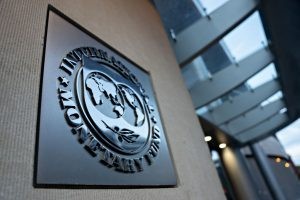
FILE PHOTO: A picture of the logo of the International Monetary Fund. (Photo: Andrew Harrer/Bloomberg via Getty Images
Sub-Saharan Africa will be the world’s slowest-growing region in 2021, with economic activity growing by 3.4 percent this year, according to a report released by the International Monetary Fund on Thursday.
Despite the region posting a recovery from the decline of 1.9 percent in 2020, the report added it will be “difficult” for the region to overcome the long-lasting effects of the COVID-19 pandemic.
“Sub-Saharan Africa’s economic growth is set to recover in 2021. Yet, the path to recovery, and overcoming the long-lasting effects of the pandemic will be difficult. Policymakers must strive to deliver vaccines, while restoring the health of public balance sheets harmed by the crisis. Transformative reforms and renewed external support are more important than ever to rekindle the region’s growth,” the report said.
Though Sub-Saharan Africa was not as hard hit by the pandemic as other regions in the world, the implementation of very strict measures to contain the spread of the virus resulted in immense economic hardships for the masses, a downturn in growth coupled and staggering job losses.
This, the IMF noted, is evidenced by the fact that the number of extreme poor in Sub-Saharan Africa is projected to have increased by more than 32 million.
Moreover, the IMF also said it did not expect the region’s per capita output to return to pre-pandemic levels until after 2022.
The report said the region was at a disadvantage in reviving their economies quickly as compared to advanced economies as most countries were not in a position to “mount the scale of extraordinary fiscal and monetary policy support” necessary to achieve that.
According to the report, Kenya and Botswana are projected to have the highest rates of growth this year at 7.6 percent and 7.5 percent respectively. They are followed by Niger (6.9 percent), Mauritius (6.6 percent) and Uganda (6.3 percent).
The continent’s two largest economies, Nigeria and South Africa, are projected to grow by 2.5 percent and 3.1 percent respectively.
Abebe Aemro Selassie, Director of the IMF’s African Department, pointed out that while pandemic-related risks remained the biggest challenges to the region’s recovery, others such as access to external financing, political instability, domestic security and climate shocks were also critical factors.
Selassie said a quicker‑than‑anticipated vaccine supply or rollout could improve the region’s short-term outlook.
“The immediate priority is to save lives. This will require more spending to strengthen health systems and containment efforts, and cover vaccine procurement and distribution. For most countries, the cost of vaccinating 60 percent of the population will require up to 50 percent increase in health spending, and could exceed 2 percent of GDP in some countries.”
Though the IMF was on hand to help the region meet its emergency needs last year, more support will be vital to help it recover losses incurred during the pandemic, Selassie said.
Cgtn.com
 Africa -China Review Africa -China Cooperation and Transformation
Africa -China Review Africa -China Cooperation and Transformation
